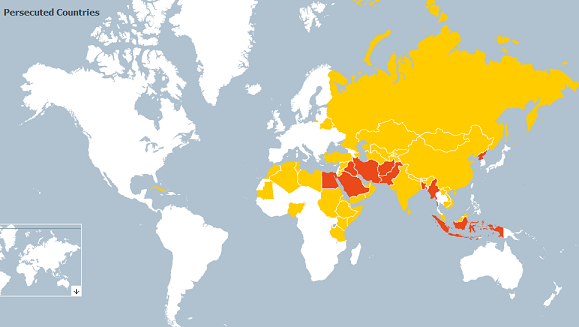Christian Persecution in the 21st Century
- Gerardo E. Martínez-Solanas
-
 Topic Author
Topic Author
- Offline
- Moderator
-

- Posts: 838
- Thanks: 78
Christian Persecution in the 21st Century
23 Aug 2013 21:27
Christianity is by far the world's most persecuted faith today. The fact is that some 200 million Christians are denied fundamental human rights because of their faith.
Christians were persecuted by atheistic states during the 20th Century, such as the USSR and its satellites, but even today Catholics do not have it easy in Russia, Cuba and China. Christians in general are being persecuted in North Korea and most muslim-dominated countries in Asia and Africa, including false Western allies such as Pakistan and Saudi Arabia.
A survey reported in 2010 that at least 75% of religious persecution around the world was directed at people of the Christian faith. The nonprofit organization Open Doors listed the 10 worse offenders among the top 50 countries where Christians are persecuted, harassed or discriminated. They were, in that order, North Korea, Saudi Arabia, Afghanistan, Syria, Iraq, Somalia, Maldives, Mali, Iran and Yemen.
Last January 2013, a United Nations special envoy reported that the civil war in Syria had reached "unprecedented levels of horror" with an estimated death toll of more than 60,000 (latest reports count them up to 100,000) and pointed out to the deteriorating situation of Christians in Syria and the resulting exodus. This extremely negative situation has extended to Lebanon, and it was rapidly developing in Egypt under Morsi's rule.
The Moscow's Christian Orthodox Patriarch, Metropolitan Hilarion, has publicly compared the situation in Syria after almost two years of fighting to the one in Iraq, which saw a virtual depopulation of Christians on the 10 years since the US invasion in 2003.
This map shows those places having the highest numbers of persecuted Christians as of 2010. The worst are in red and the others in yellow. Syria appears in yellow because this map was drawn before the most recent tragic events in that country. In many of these countries it is illegal to own a Bible, to share or proclaim your faith in Christ, to teach your children about Jesus or, still worse, to experience conversion to the Christian faith. Those who boldly practice their faith not only are harassed and discriminated but often arrested, tortured or even executed.
It does not make sense to turn our backs to these facts and go on with our unconcerned lives, because evil leaders and regimes do not have a limit to their ambitions and thirst for power. Sooner or latter freedom and democracy lovers will have to confront them and the longer we wait to take the challenge the worst the conflict will be.
Angela Merkel declared last November that Christianity is "the most persecuted religion in the world", but what have she done about it? What actions the other World leaders have taken to protect peoples from religious persecution?
Human rights violators on grounds of religious intolerance express their aggressive views quite openly. In the website "Guardians of the Faith" one may read that "Being a Muslim who fights to defend his honor and his faith is better than being a Christian" or that "Being a Muslim girl whose role models are the wives of the Prophet, who were required to wear the hijab, is better than being a Christian girl, whose role models are whores".
In 2011, Shahbaz Bhatti was murdered by the Pakistani Taliban for his opposition to Pakistan's anti-blasphemy laws. Bhatti, a Catholic, was Pakistan's Minister for Minorities. In fact, a death sentence is meted out to any Pakistani courageous enough to speak out in defense of religious minorities. His worse sin was to declare that "I am living for my community and for suffering people and I will die to defend their rights. I prefer to die for my principles and for the justice of my community rather than to compromise. I want to share that I believe in Jesus Christ, who has given his own life for us. I know... the meaning of the Cross and I follow him on the Cross." Bhatti's two known killers have never been charged.
Religious liberties are among the most fundamental human liberties and they underline a country's political willingness to allow people to choose their own way of life. In countries were religious liberty is conspicuously absent, one is likely to find a host of other liberties threatened as well. And the problem is that the malady tends to spread like a deathly virus.
It is time for the World to wake-up and do something.
Christians were persecuted by atheistic states during the 20th Century, such as the USSR and its satellites, but even today Catholics do not have it easy in Russia, Cuba and China. Christians in general are being persecuted in North Korea and most muslim-dominated countries in Asia and Africa, including false Western allies such as Pakistan and Saudi Arabia.
A survey reported in 2010 that at least 75% of religious persecution around the world was directed at people of the Christian faith. The nonprofit organization Open Doors listed the 10 worse offenders among the top 50 countries where Christians are persecuted, harassed or discriminated. They were, in that order, North Korea, Saudi Arabia, Afghanistan, Syria, Iraq, Somalia, Maldives, Mali, Iran and Yemen.
Last January 2013, a United Nations special envoy reported that the civil war in Syria had reached "unprecedented levels of horror" with an estimated death toll of more than 60,000 (latest reports count them up to 100,000) and pointed out to the deteriorating situation of Christians in Syria and the resulting exodus. This extremely negative situation has extended to Lebanon, and it was rapidly developing in Egypt under Morsi's rule.
The Moscow's Christian Orthodox Patriarch, Metropolitan Hilarion, has publicly compared the situation in Syria after almost two years of fighting to the one in Iraq, which saw a virtual depopulation of Christians on the 10 years since the US invasion in 2003.
This map shows those places having the highest numbers of persecuted Christians as of 2010. The worst are in red and the others in yellow. Syria appears in yellow because this map was drawn before the most recent tragic events in that country. In many of these countries it is illegal to own a Bible, to share or proclaim your faith in Christ, to teach your children about Jesus or, still worse, to experience conversion to the Christian faith. Those who boldly practice their faith not only are harassed and discriminated but often arrested, tortured or even executed.
It does not make sense to turn our backs to these facts and go on with our unconcerned lives, because evil leaders and regimes do not have a limit to their ambitions and thirst for power. Sooner or latter freedom and democracy lovers will have to confront them and the longer we wait to take the challenge the worst the conflict will be.
Angela Merkel declared last November that Christianity is "the most persecuted religion in the world", but what have she done about it? What actions the other World leaders have taken to protect peoples from religious persecution?
Human rights violators on grounds of religious intolerance express their aggressive views quite openly. In the website "Guardians of the Faith" one may read that "Being a Muslim who fights to defend his honor and his faith is better than being a Christian" or that "Being a Muslim girl whose role models are the wives of the Prophet, who were required to wear the hijab, is better than being a Christian girl, whose role models are whores".
In 2011, Shahbaz Bhatti was murdered by the Pakistani Taliban for his opposition to Pakistan's anti-blasphemy laws. Bhatti, a Catholic, was Pakistan's Minister for Minorities. In fact, a death sentence is meted out to any Pakistani courageous enough to speak out in defense of religious minorities. His worse sin was to declare that "I am living for my community and for suffering people and I will die to defend their rights. I prefer to die for my principles and for the justice of my community rather than to compromise. I want to share that I believe in Jesus Christ, who has given his own life for us. I know... the meaning of the Cross and I follow him on the Cross." Bhatti's two known killers have never been charged.
Religious liberties are among the most fundamental human liberties and they underline a country's political willingness to allow people to choose their own way of life. In countries were religious liberty is conspicuously absent, one is likely to find a host of other liberties threatened as well. And the problem is that the malady tends to spread like a deathly virus.
It is time for the World to wake-up and do something.
Reply to Gerardo E. Martínez-Solanas
Moderators: Miguel Saludes, Abelardo Pérez García, Oílda del Castillo, Ricardo Puerta, Antonio Llaca, Efraín Infante, Pedro S. Campos, Héctor Caraballo
Time to create page: 0.680 seconds
